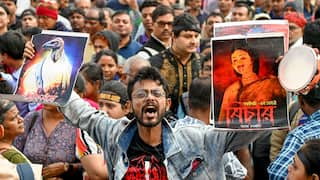Amid Empty Oppn Benches, Lok Sabha Passes Bills To Overhaul Criminal Laws
The Lok Sabha has passed the Bharatiya Nyaya (Second) Sanhita, 2023, The Bharatiya Nagarik Suraksha (Second) Sanhita, 2023, and The Bharatiya Sakshya (Second) Bill, 2023.

The Lok Sabha on Wednesday passed three bills — the Bharatiya Nyaya (Second) Sanhita, 2023, The Bharatiya Nagarik Suraksha (Second) Sanhita, 2023, and The Bharatiya Sakshya (Second) Bill, 2023 — aiming to replace key components of India's criminal legal framework which includes the Indian Penal Code of 1860, the Code of Criminal Procedure (CrPC) of 1973, and the Indian Evidence Act of 1872.
It is pertinent to note that only 7 MPs from the principal Opposition, Congress, including former party presidents Sonia Gandhi and Rahul Gandhi, remain in the House after 49 opposition MPs were suspended for the rest of the session on Tuesday.
Following a series of suspensions in Lok Sabha, the I.N.D.I.A. bloc lost more than two-thirds of its strength during the Winter Session. The Opposition alliance, which originally had 138 members, now has only 43 MPs present. The total count of suspended MPs in Lok Sabha to 95 with leaders like Adhir Ranjan Chowdhury from Congress and Sudip Bandyopadhyay from Trinamool Congress.
Last week, Union Home Minister Amit Shah introduced these amended criminal law bills in the Lok Sabha, seeking to replace the existing IPC, CrPC, and Indian Evidence Act. The bills had initially been presented during the monsoon session but were withdrawn for modifications.
Shah highlighted that these changes were necessary after the bills were scrutinised by the Standing Committee, and rather than introducing official amendments, it was decided to reintroduce them. The bills, known as Bharatiya Nyaya (Second) Sanhita 2023, Bharatiya Nagarik Suraksha (Second) Sanhita 2023, and Bharatiya Sakshya (Second) Bill 2023, are part of the government's efforts to modernise and update India's criminal laws.
Key Changes In The Bills: Centre Broadens Definition Of 'Terrorist Act', Replaces 'Mental Illness' With 'Unsound Mind'
In the revised drafts, the Centre modified the legal definition of a "terrorist act," broadening it to include threats to financial security. This encompasses actions like spreading counterfeit currency, kidnapping, injuring, or causing the death of a public functionary.
Key changes also include the introduction of Section 73 (publishing court proceedings without permission) and Section 86 (redefining cruelty) in the Bharatiya Nyaya Sanhita. Section 73 imposes penalties for printing or publishing court proceedings related to rape or sexual assault without permission. Section 86 defines cruelty, as encompassing actions that may drive a woman to suicide or cause grave injury.
One significant alteration in the redrafted criminal law bills is the replacement of the term "mental illness" with "unsound mind." The change, suggested by a parliamentary panel, aims to provide a more precise definition, excluding issues like mood swings or voluntary intoxication, news agency PTI reported.
The revised version of the Bharatiya Nyaya Sanhita Bill incorporates the term "unsound mind" in place of "mental illness." It states, "Nothing is an offence which is done by a person who, at the time of doing it, by reason of unsoundness of mind, is incapable of knowing the nature of the act, or that he is doing what is either wrong or contrary to law."
However, two significant recommendations by the parliamentary panel were not adopted. The suggestions included retaining IPC section 377 provisions related to carnal intercourse with minors and acts of bestiality in the proposed bills.
Additionally, the government rejected the panel's proposal to maintain the IPC provision related to adultery, suggesting it should be gender-neutral "for the sake of protecting the institution of marriage."
Subscribe And Follow ABP Live On Telegram: https://t.me/officialabplive
Trending News
Top Headlines








































